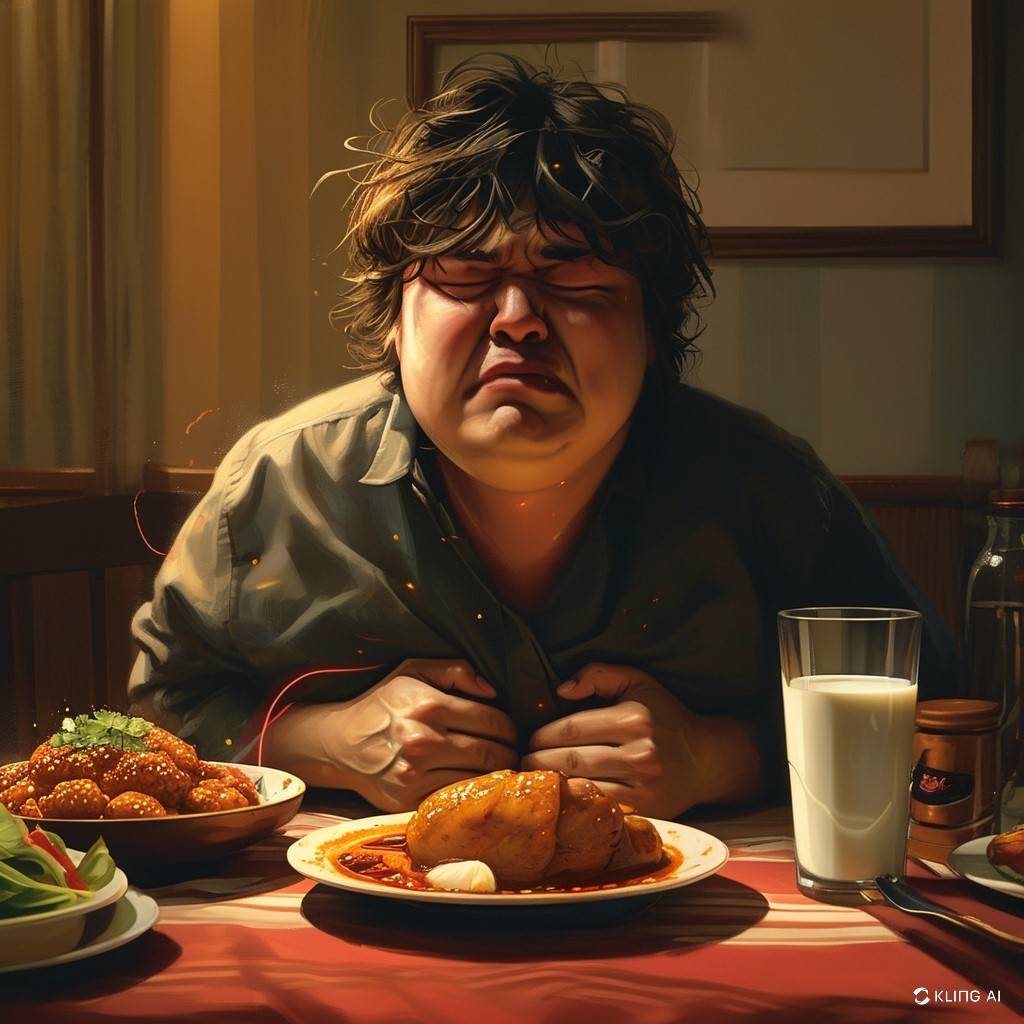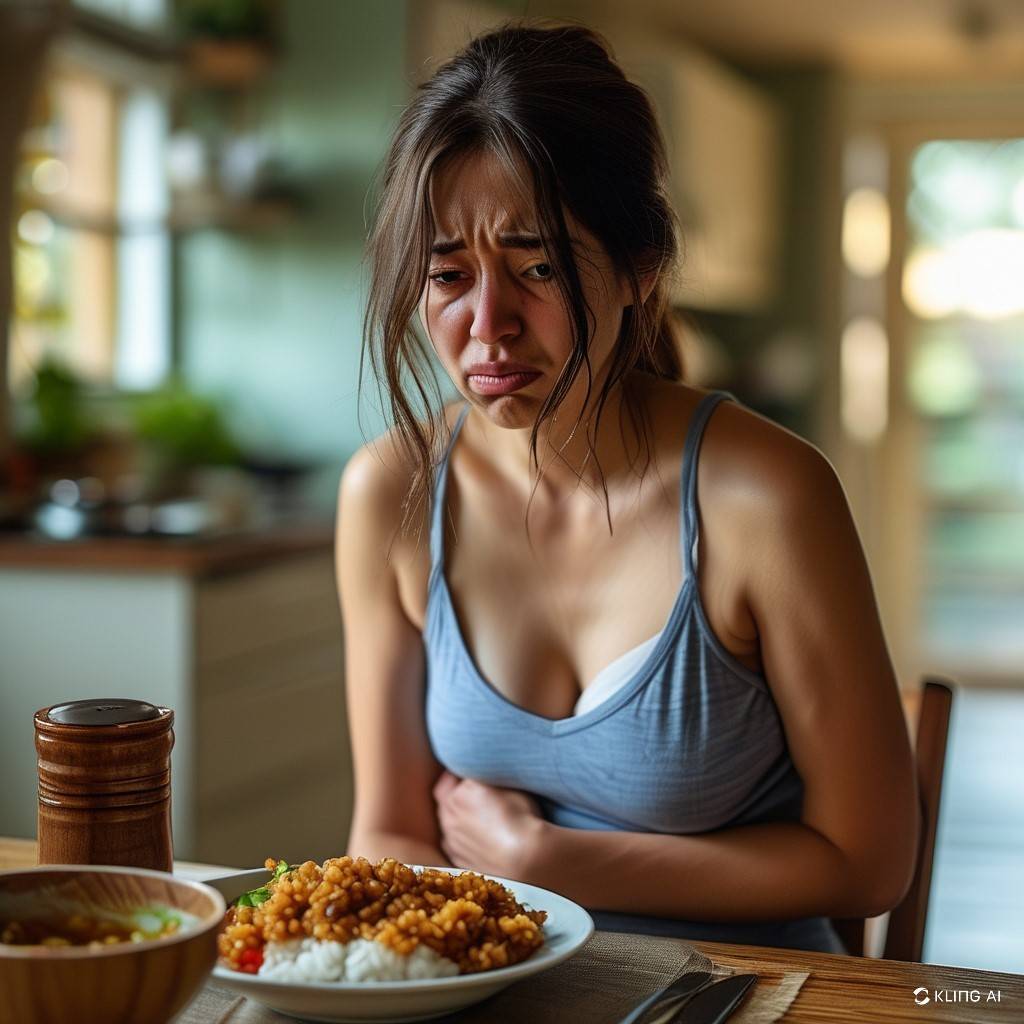Stomach pain after eating is something everyone experiences at some point. It can show up as stomach cramps, bloating after meals, or even a burning sensation.
If you’re dealing with this regularly, it can be frustrating and worrisome. I’ve seen many friends and family go through this, and I’ve dealt with it myself.
The good news is that understanding the common causes and making a few simple changes can help. Let’s dive into the details.
What Causes Stomach Pain After Eating?

There are many reasons why you might feel stomach pain after eating. Some are minor and easy to manage, while others might need medical attention.
Here’s a look at the most common causes:
-
Indigestion (Dyspepsia)
Indigestion happens when your stomach has trouble breaking down food. It can make you feel full and bloated, or cause stomach cramps.
Sometimes, you may feel a burning sensation in your upper abdomen. I often notice this if I eat too quickly or have a meal that’s too heavy.
Quick Fix: Eat smaller meals more often instead of enormous meals. Chew your food slowly and avoid fatty or spicy foods.
This is important because eating habits can significantly affect the prevention of indigestion.
-
Acid Reflux (GERD)
Acid reflux, also known as GERD, occurs when stomach acid flows back up into the esophagus.
This can cause heartburn, a burning feeling in the chest, and sometimes even abdominal discomfort.
I prefer to avoid lying down immediately after eating because it can exacerbate reflux.
Quick Fix: Avoid foods that trigger acid reflux, like caffeine, alcohol, and spicy foods. Eat smaller portions and try not to eat right before bed.
Changing meal timing can reduce the risk of acid reflux.
-
Food Intolerances and Allergies
If you often feel stomach pain, bloating, or gas after eating certain foods, you might have food intolerance or allergies.
For example, lactose intolerance makes it hard to digest dairy, while gluten sensitivity can cause bloating and stomach cramps.
Quick Fix: Keep a food diary to track what you eat and how you feel afterward. This can help you identify foods that cause problems.
I’ve seen people find relief just by cutting out one or two things from their diet.
Tracking food helps identify triggers and avoid unnecessary pain.
-
Overeating
It’s easy to eat too much, especially during holidays or special occasions. But overeating can cause your stomach to stretch, leading to slow digestion and pain. I always remind myself to eat smaller portions because it helps prevent discomfort later.
Quick Fix: Practice portion control. Use smaller plates and don’t go back for seconds.
Chew your food well and listen to your body. It often tells you when it’s full.
Smaller portions prevent overloading your digestive system.
-
Irritable Bowel Syndrome (IBS)
IBS is a disorder that affects the digestive system. It can cause stomach cramps, gas, bloating after meals, and changes in bowel habits.
I’ve seen stress make IBS symptoms worse, so it’s not just about what you eat but also how you manage your daily routine.
Quick Fix: Avoid foods that trigger symptoms, like caffeine, alcohol, and fatty foods. Practicing stress management methods like yoga or meditation can help minimize flare-ups.
Combining diet changes with stress management can provide better relief.
-
Gallbladder Issues
If you experience a sharp pain in the upper right side of your abdomen after eating fatty foods, it could be a sign of gallbladder issues like gallstones.
I’ve known people who had to get their gallbladder removed because the pain became unbearable.
Quick Fix: If you suspect gallbladder issues, see a doctor.
You may need an ultrasound to confirm if gallstones are present. In some cases, surgery might be necessary to remove the gallbladder.
Gallbladder issues can get worse if left untreated.
-
Stomach Ulcers
Stomach ulcers are soaring that form on the lining of the stomach or the upper part of the small intestine. They may trigger a burning sensation, particularly when the stomach is empty. Eating might temporarily relieve the pain, but it often returns soon after.
Quick Fix: Avoid foods that can irritate the ulcer, such as spicy foods, alcohol, and acidic foods. Over-the-counter antacids can help reduce pain, but you should see a doctor for proper treatment.
Ulcers need medical attention to prevent complications.
How to Ease Stomach Pain After Eating

There are several steps you can take at home to ease stomach pain after meals.
Here are a few of the tips I like best:
-
Eat Slowly and Chew Thoroughly
Eating too fast can cause indigestion and gas. I like to take my time and chew my food well. This helps your stomach break down food better.
-
Stay Hydrated
Drinking water throughout the day can help with digestion, but avoid drinking too much during meals. It can dilute stomach acid and slow down digestion.
Proper hydration supports overall digestive health.
-
Use Digestive Enzymes
If you have slow digestion, digestive enzyme supplements might help. I’ve tried them before, and they can be effective in breaking down certain types of food. Look for enzymes that help with proteins, fats, and carbs.
-
Add Probiotics to Your Diet
Probiotics support gut health by balancing the bacteria in your digestive system. You can get them from yogurt, kefir, or supplements. I like to add a probiotic-rich food to my diet every day.
-
Avoid Trigger Foods
Pay attention to foods that cause discomfort, such as fatty foods, spicy foods, or certain dairy products. It’s okay to enjoy these foods occasionally, but don’t overdo it if they make you feel bad.
Common Stomach Pains You Shouldn’t Ignore
Some stomach pains require medical attention. If you have any of these, see a doctor:
- Sharp, Sudden Pain: Especially if it gets worse over time.
- Pain with vomiting or fever: This could be an infection or blockage.
- Pain Radiating to Your Chest: This may indicate a heart attack or gallbladder issue.
- Blood in Your Stool or vomit: This could be a sign of bleeding in your digestive system.
What Are the Four Types of Stomach Pain?
There are different types of stomach pain, and knowing what kind you have can help find the cause:
- Upper Abdominal Pain: Often linked to acid reflux, gallbladder issues, or heartburn.
- Lower Abdominal Pain: This can be caused by IBS, constipation, or infections.
- Generalized Pain: If it’s all over, it might be indigestion, gas, or gastroenteritis (a stomach bug).
- Localized Pain: Pain in a specific spot, like the lower right side, could mean appendicitis.
Tips for Preventing Stomach Pain After Eating
Here are some simple habits that can help you avoid stomach pain:
-
Adjust Meal Timing
Avoid eating enormous meals late at night or skipping meals. Eating regularly helps keep your digestion on track. Having three balanced meals a day with small snacks in between works well.
-
Manage Stress
Stress can cause your stomach to produce more acid, leading to pain. I’ve found that relaxation techniques like breathing exercises or light stretching help a lot. [Stress management can make a big difference for people with stress-related stomach pain.]
- Increase Fiber Slowly
Fibre is beneficial for digestion, but introducing too much too fast may lead to gas and bloating. I like to start with a handful and accumulate it. Sources include fruits, vegetables, and whole grains.
-
Stay Active
A short walk after meals can help stimulate digestion. I walk for at least 15 minutes after dinner, and I notice better when I do.
-
Avoid Smoking and Limit Alcohol
Both smoking and drinking too much alcohol can irritate your stomach and lead to acid reflux or ulcers. If you smoke, quitting can help reduce symptoms. I’ve noticed that even just cutting back on alcohol can make a big difference in how I feel.
How to Tell if Your Stomach Pain Is Serious
If you experience stomach pain that doesn’t go away or keeps coming back, it could be a sign of a more serious problem. Other symptoms to watch for include:
- Unintended Weight Loss
- Severe Bloating After Meals
- Nausea After Eating for Several Days
- Fever Along with Abdominal Pain
If you have any of these symptoms, don’t ignore them. It’s better to get checked out by a doctor to make sure everything is okay.
FAQs About Stomach Pain After Eating
How do I know if my stomach pain is serious?
Not all stomach pain is a cause for concern, but there are certain signs to watch out for. If your stomach pain is severe, lasts more than a few days, or is accompanied by other symptoms like fever, vomiting, weight loss, or blood in your stool, it’s important to see a doctor. These could be signs of a more serious condition like appendicitis, gallstones, or a peptic ulcer.
Why does my stomach hurt after every meal?
If you’re experiencing stomach pain after every meal, it could be because of a variety of reasons. Food intolerances, IBS, or acid reflux are common causes. Eating too quickly or consuming large portions can also stress your digestive system. To find out the exact cause, try keeping a food diary to track what you eat and any symptoms. If the pain persists, it’s best to consult a doctor for a proper diagnosis.
What stomach pains should you never ignore?
Some stomach pains require immediate medical attention. If you experience any of the following, don’t ignore them:
- Suddenly, sharp pain that worsens over time
- Pain that radiates to your chest, shoulder, or back
- Pain accompanied by vomiting, fever, or difficulty breathing
- Blood in your stool or vomit
- Severe bloating or swelling of the abdomen
These could be signs of serious conditions like appendicitis, gallstones, or intestinal blockages.
What are the four types of stomach pain?
Stomach pain can be classified into four types based on its location and nature:
- Upper Abdominal Pain: Often caused by acid reflux, indigestion, or gallstones. Pain is usually felt in the upper part of the stomach.
- Lower Abdominal Pain: This can be related to issues like irritable bowel syndrome (IBS), constipation, or infections. The pain is usually below your belly button.
- Generalized Abdominal Pain: If the pain is spread across the whole abdomen, it may be caused by indigestion, gas, or a stomach virus.
- Localized Abdominal Pain: This is pain that is concentrated in one specific area of the stomach. It could indicate a more serious condition, like an ulcer or appendicitis.
Conclusion
Stomach pain after eating can happen for many reasons, from simple things like overeating or eating too quickly to more serious conditions like gallbladder issues or stomach ulcers. The key is to pay attention to your symptoms and make minor changes that can make a big difference.
Try eating smaller meals, avoiding trigger foods, and managing stress. These simple adjustments often help reduce abdominal discomfort, bloating, or other IBS symptoms. But if your pain is severe or doesn’t go away, it’s time to see a doctor.
Recommended Reading
- Stomach Pain Gurgling Gas: Understanding the Symptoms and Solutions
- Stomach Gurgling Pain and Bloating: 15 Causes and 20 Proven Solutions
- Stomach Gurgling Pain Diarrhea: 10 Causes and 15 Quick Relief Tips

Adel Galal is a health and wellness writer with over 30 years of experience studying and writing about health, fitness, nutrition, and healthy living. He is the founder of NextFitLife.com, where he shares practical, evidence-based guidance to support long-term health at any age. Adel’s mission is simple:
to help people make smarter health choices that fit real life, at any age.



